
Sheepshead is an American trick-taking card game derived from Bavaria's national card game, Schafkopf, hence it is sometimes called American Schafkopf. Sheepshead is most commonly played by five players, but variants exist to allow for two to eight players. There are also many other variants to the game rules, and many slang terms used with the game.
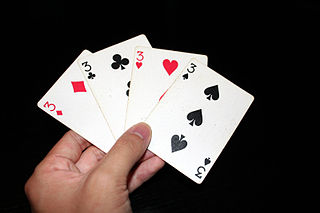
Gin Rummy, or simply Gin, is a two-player card game variant of Rummy. It has enjoyed widespread popularity as both a social and a gambling game, especially during the mid twentieth century, and remains today one of the most widely played two-player card games.

Primero, is a 16th-century gambling card game of which the earliest reference dates back to 1526. Primero is closely related to the game of primo visto, if not the same. It is also believed to be one of the ancestors to the modern game of poker, to which it is strikingly similar.
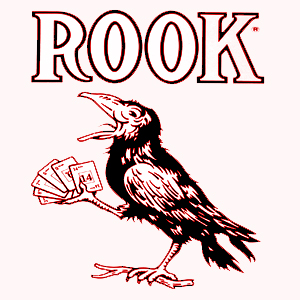
Rook is a trick-taking game, usually played with a specialized deck of cards. Sometimes referred to as Christian cards or missionary cards, Rook playing cards were introduced by Parker Brothers in 1906 to provide an alternative to standard playing cards for those in the Puritan tradition, and those in Mennonite culture who considered the face cards in a regular deck inappropriate because of their association with gambling and cartomancy.
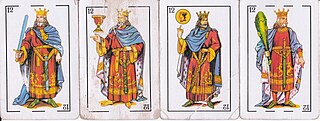
Escoba is a Spanish variant of the Italian fishing card game Scopa, which means "broom", a name that refers to the situation in the game where all of the cards from the board are "swept" in one turn. The game is usually played with a deck of traditional Spanish playing cards, called naipes.
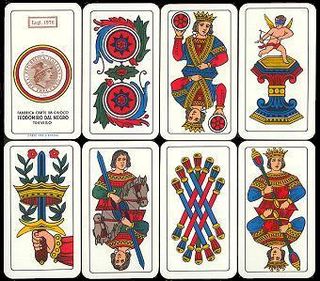
Scopa is an Italian card game, and one of the three major national card games in Italy, the others being Briscola and Tresette. It is also popular in Argentina and Brazil, brought in by Italian immigrants, mostly in the Scopa a Quindici variation. Scopa is also played in former Italian colonies such as Libya and Somalia or some other countries like Tunisia and even Morocco, with changed appearance in the cards. It is played with a standard Italian 40-card deck, mostly between two players or four in two partnerships, but it can also be played by three or six players.

Cassino, sometimes spelt Casino, is an English card game for two to four players using a standard, 52-card, French-suited pack. It is the only fishing game to have penetrated the English-speaking world. It is similar to the later Italian game of Scopa and is often said, without substantiation, to be of Italian origin. Cassino is still played today in Madeira, probably due to English influence.
Bonken is a Dutch trick-taking card game for 4 players that is played with a standard pack of cards. Everyone plays for themselves. It is a compendium game of 11 rounds, each of which has its own goal. The aim of the game is to score as few penalty points as possible. The player who scores the fewest points is declared the winner.
Pedro is an American trick-taking card game of the all fours family based on auction pitch. Its most popular variant is known as cinch, double Pedro or high five which was developed in Denver, Colorado, around 1885 and soon regarded as the most important American member of the all fours family. Although it went out of fashion with the rise of auction bridge, it is still widely played on the western coast of the United States and in its southern states, being the dominant game in South Louisiana. Forms of the game have been reported from Nicaragua, the Azores, Niobe NY, Italy, and Finland. The game is primarily played by four players in fixed partnerships, but can also be played by 2–6 individual players.

Briscola is one of Italy's most popular games, together with Scopa and Tressette. A little-changed descendant of Brusquembille, the ancestor of briscan and bezique, Briscola is a Mediterranean trick-taking ace–ten card game for two to six players, played with a standard Italian 40-card deck.

Truco, a variant of Truc, is a trick-taking card game originally from Valencia and the Balearic Islands, popular in South America and Italy. It is usually played using a Spanish deck. Two people may play, or two teams of two or three players each.
Sueca is a 4 player-partnership point trick-taking card game of the ace–ten family, and a popular variant of the Bisca card game. The game is played in Portugal, Brazil, Angola and other Portuguese communities. Its closest relative is the very similar German game Einwerfen.

Tressette or Tresette is a 40-card, trick-taking card game. It is one of Italy's major national card games, together with Scopa and Briscola. It is also popular in the regions that were once controlled by the Italian predecessor states, such as Albania, Montenegro, coastal Slovenia and coastal Croatia. It is also played in the Canton of Ticino with a French-suited deck. The Austrian game Trischettn as historically played in South Tyrol is also a derivative, albeit played with a 32-card German-suited deck.
Pasur or chahar barg is a fishing card game of Persian origin. Played widely in Iran, it is played similarly to the Italian games of Cassino or Scopa and even more similarly to the Egyptian game of Bastra. Pasur is also known by the names Chahâr Barg, Haft Khâj or Haft Va Chahâr, Yâzdah.
Basra is a fishing card game, similar to cassino, and popular in Cyprus. The game is also popular in Egypt, Lebanon, and other Middle Eastern countries. The name is Greek borrowing from the Arabic word Basra. In Turkey, the game is known as pişti or pişpirik.
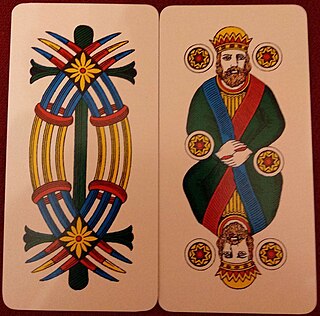
Sette e mezzo is an Italian comparing card game similar to blackjack. In Spanish it is known as Siete y Media. It is traditionally played in Italy during Christmas holidays. The game is also known in English as Seven and a half.

Gong Zhu (拱猪) is a Chinese four-player trick-taking card game that is similar to Black Lady, the leading member of the Hearts family. However, it differs in that it assigns quite different point values to cards. The objective of the game is to score positive points and avoid penalty points. Gong Zhu means: Push Out the Pig, for "pig" is the name given to the Q♠.
Buraco is a Rummy-type card game in the Canasta family for four players in fixed partnerships in which the aim is to lay down combinations in groups of cards of equal rank and suit sequences, there being a bonus for combinations of seven cards or more. Buraco is a variation of Canasta which allows both standard melds as well as sequences. It originated from Uruguay and Argentina in the mid-1940s, with apparent characteristics of simplicity and implications that are often unforeseeable and absolutely involving. Its name derives from the Portuguese word "buraco" which means “hole”, applied to the minus score of any of the two partnerships. The game is also popular in the Arab world, specifically in the Persian Gulf; where it is known as 'Baraziliya' (Brazilian). Another popular variation of Buraco is Italian.
Bisca is a card game based on the Italian deck.

Cicera bigia is an Italian card game closely related to Scopa and played with a 52-card deck of Bresciane playing cards. It is mainly played in the province of Brescia, and most of the technical terms used in the game originate in the local Bresciano dialect of the Lombard language.












